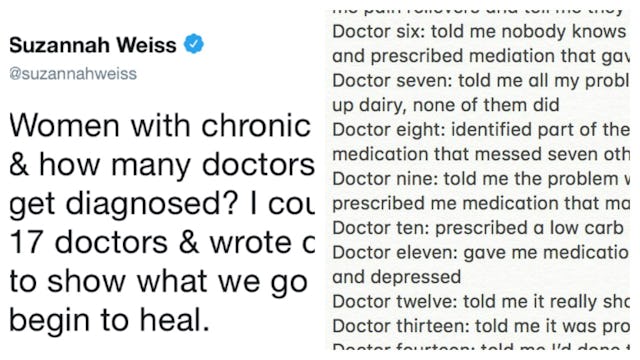Women Are Sharing How Many Doctors It Took To Diagnose Them In Powerful Twitter Thread

A viral Twitter thread is sparking conversation about the difficulties women face when seeking a diagnosis and treatment for their chronic illnesses.
In a tweet, writer Suzannah Weiss asked women how long and how many doctors it took them to get diagnosed. She listed her own experience with 17 different doctors she sought care from over an 11-month period, and “wrote down what each did to show what [patients] go through just to begin to heal.”
Weiss’ thread highlights how critical it is for medical professionals to take their patients seriously and trust they know their body best – regardless of gender identity, race, sexual orientation, or religion.
Throughout history, women have been diagnosed with “hysteria” or told their physical symptoms are due to mental illness. This false notion that women are “overreacting” or don’t understand their bodies has resulted in women not being believed or taken seriously. Sexism continues to be widely prevalent in medicine, with the National Pain Report reporting in 2014 that over 90 percent of women with chronic pain feel the health care system discriminates against female patients.
Weiss’ doctors’ responded to her health concerns differently, from brushing off her symptoms as a mental health issue; prescribing medications, treatments and lifestyle changes that were not just ineffective, but often harmful; to dismissing her symptoms entirely. For many women with chronic illness, these experiences sound painfully familiar.
“We get called hypochondriacs when what we really are is empowered & determined to love & care for ourselves,” Weiss wrote.
Other women were quick to chime in on Twitter and share their own stories of struggling to obtain a diagnosis.
https://twitter.com/jetpack/status/1054060461405147138
In her essay “What Physicians Need to Realize About Sexism in the Chronic Illness Medical Community,” Mighty contributor Sofia Ana discusses the importance of medical professionals listening to their patients and fostering “open, honest communication” so that female patients feel mentally and physically comfortable and have their concerns addressed. She said:
“Our doctors and other medical caretakers need to notice the dedication and determination we have when it comes to our health. They need to take us seriously, they need to treat us with compassion and empathy. Rather than belittling our feelings and minimizing our symptoms, they can be inspired by our strength and work to give us a less discriminatory, happier, more stable experience dedicated to keeping us the healthy human beings we deserve to be.”
If you can relate to the experiences of the women above, know you are not alone, and you deserve to be respected and listened to no matter what.
“Just because a doctor says something doesn’t make it true,” Weiss explained to The Mighty, adding:
“You know your body better than anyone else. If what a doctor tells you seems off, get another opinion. Then another. Especially if they’re telling you nothing’s wrong when you know there is, and especially if they’re telling you it’s anxiety or depression when you know there’s something more. This is something women deal with in medical settings all the time, so be wary of it and trust your intuition, even if it seems like nobody else is on your side. Don’t let anyone tell you you’re being dramatic or the problem isn’t serious. If it’s impacting your quality of life, it is. You deserve to feel completely well. Don’t settle for anything less.”
To keep the conversation going, Weiss created a new hashtag, #MyDoctorSaid, to shine a light on the hurtful and ignorant comments some medical professionals make.
Originally published on The Mighty.
This article was originally published on